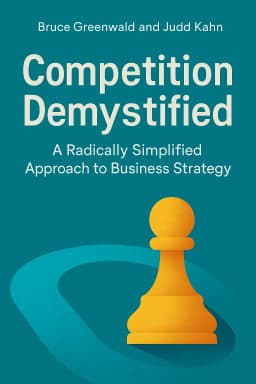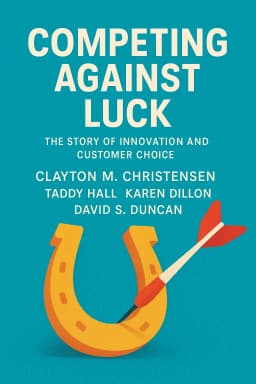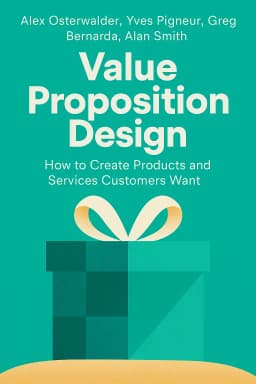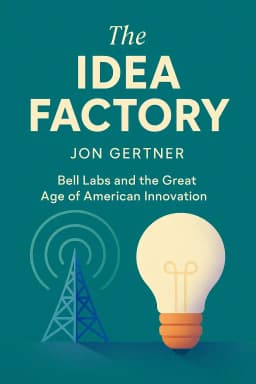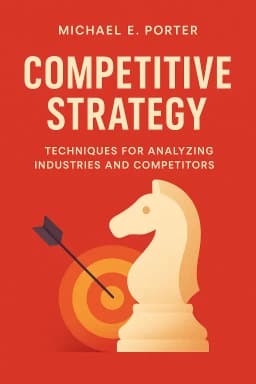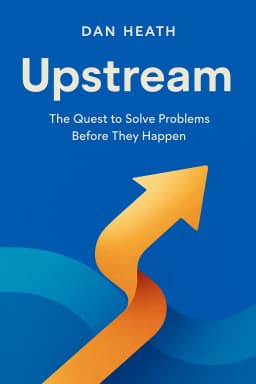
The Innovator's Compass: Why 'Just Enough Research' is Non-Negotiable
Golden Hook & Introduction
SECTION
Nova: Imagine it's 2001. The internet is buzzing about a secret invention, codenamed 'Ginger.' Tech visionaries like Steve Jobs and Jeff Bezos are saying it will be bigger than the PC. It's going to revolutionize how we live and move. Millions are invested. The hype is off the charts. Then, it's revealed: the Segway. And... it flops. Spectacularly. Why? Why does a brilliant idea, backed by brilliant people, fail so badly?
Daniel Davidson: That question is at the heart of so much in the tech world. It's the ghost that haunts every product launch.
Nova: It really is. And that's the central question we're exploring today through Erika Hall's fantastic book, 'Just Enough Research.' We're going to see how even the smartest people can get it wrong and what we can learn from it. I'm your host, Nova, and I'm thrilled to have Daniel Davidson here with us. Daniel is a technology educator with over fifteen years of experience, and he's passionate about innovation, so he is the perfect person to help us unpack this. Welcome, Daniel!
Daniel Davidson: Thanks for having me, Nova. That Segway story is one I actually use in my classes, so this is right up my alley.
Nova: I thought it might be! So today we'll dive deep into this from two perspectives. First, we'll explore the innovator's blind spot by looking at why great ideas fail, and then we'll reframe research as a form of detective work, moving beyond simply asking people what they want.
Deep Dive into Core Topic 1: The Innovator's Blind Spot
SECTION
Nova: So Daniel, as someone who teaches the next generation of tech creators, that Segway story must resonate deeply. What's your immediate, analytical take on it?
Daniel Davidson: It's a classic case of what we call a 'technology push' without a 'market pull.' The inventor, Dean Kamen, was a brilliant engineer. He created this incredible piece of self-balancing technology. But he, and all the smart people who invested, fell in love with the solution before they truly understood the problem they were solving for an actual person. They were so dazzled by the 'what' that they forgot to ask 'why' or 'where.'
Nova: You've hit the nail on the head. And Erika Hall, in the book, points out that the Segway's creators never stopped to ask those fundamental questions. She lays it out so clearly: the Segway was slower than a car, more expensive than a bicycle, you couldn't take it inside most buildings, and you looked a little silly riding it. So, where did it fit into a person's daily life? They completely ignored the existing context of transportation.
Daniel Davidson: Exactly. It didn't replace the car for long trips or the bike for exercise or short trips. It was a solution in search of a problem. And that's a costly mistake.
Nova: Incredibly costly. And this isn't just a trap for new, revolutionary inventions. Hall tells this other amazing story about an insurance company. They hired a design firm to help them innovate, to come up with new product ideas using emerging technology. They wanted 'blue-sky thinking.'
Daniel Davidson: Okay, that sounds promising so far.
Nova: Right? But here's the catch. The design firm said, "Great, to start, we'd like to talk to your salespeople and agents to understand how they work and what customers are asking for." And the executives at the insurance company refused. They literally said, "We don't want current practices to inhibit creativity."
Daniel Davidson: Wow. That's... fascinatingly backward. That's like telling an architect not to look at the building site before designing a house. The current state of things is the foundation for innovation. You have to know the rules before you can break them effectively. It's a total misunderstanding of where creative leaps come from.
Nova: It is! And you can just feel the design team's frustration. How can you design a better future if you're not allowed to understand the present?
Daniel Davidson: It reminds me of the stories about Steve Jobs. People say he didn't do research, but that's not true. He obsessed over every detail of existing products. Before the iPod, he understood the frustration of clunky CD players and terrible music management software. He didn't ask people, "Do you want a tiny white rectangle that holds 1,000 songs?" He observed the pain points of the current system and designed a solution for that. He understood the context.
Nova: That's such a great point. He was doing the research, just not in the way we might picture it with clipboards and surveys. And that's really the first big lesson from 'Just Enough Research': pure enthusiasm, even from the most brilliant minds, is not enough. You have to understand the world you're trying to change. Ignoring your context, whether it's the city street for the Segway or the sales desk for the insurance company, is a recipe for failure.
Daniel Davidson: It's a form of arrogance, in a way. The belief that your idea is so brilliant it can just be dropped into the world and the world will reshape itself around it. History shows that almost never works.
Nova: Almost never. But that raises a huge question, doesn't it? If you're creating something truly new, like the first iPhone, how can you research it? People can't tell you they want something that doesn't exist.
Daniel Davidson: That's the classic innovator's dilemma.
Nova: Exactly. And this leads us to the second, and maybe the most powerful, idea in the book: you have to stop asking people what they want.
Deep Dive into Core Topic 2: Research as Detective Work
SECTION
Daniel Davidson: Okay, now that sounds counterintuitive. How do you find out what people need if you don't ask them?
Nova: Well, Hall uses a brilliant metaphor to explain it. Think of the TV show House. What's his famous line?
Daniel Davidson: "Everybody lies."
Nova: Precisely. And in the show, patients never walk in and tell him the real, underlying problem. They lie, they misremember, they're embarrassed, or they just don't know. A patient might say "I have a headache," but the cause is some rare fungus they picked up from their pet bird. So, if House just treated the headache, the patient would never get better. What does his team do instead?
Daniel Davidson: They break into the patient's house. They snoop around their life.
Nova: Yes! They do what's called ethnographic research. They observe the person's environment, their habits, the things they're hiding. They look for clues that reveal the real problem. And Hall argues that's what great design research is. It's not about asking someone, "Do you like this blue button or this green button?" It's about watching them struggle to complete a task and understanding their deep, unmet need.
Daniel Davidson: So research becomes a diagnostic tool. It's detective work. I like that. It fits the way I think. It's about gathering evidence, not opinions.
Nova: Exactly. The book has this fantastic quote: "'Like' is not a part of the critical thinker’s vocabulary." Asking someone if they 'like' something is useless. It's a subjective, fleeting feeling. Asking them to perform a task and observing where they succeed or fail—that gives you hard data.
Daniel Davidson: This is a huge shift in perspective. In education, for example, we're often tempted to ask students, "What's the most fun way to learn about this topic?" And you'll get a hundred different, often unhelpful, answers. But the real insight comes from giving them a problem to solve and watching where they get stuck, what tools they reach for, what frustrates them. The behavior reveals the design problem in your curriculum.
Nova: What a perfect application of the principle. You're not asking for their preference; you're observing their process. You're being a detective.
Daniel Davidson: And it honors the user, or the student, in a deeper way. It says, "I trust your actions more than your words, because your actions reveal your true needs." It's more empathetic, in a way.
Nova: I think so too. It transforms research from this boring, formal thing that many creative people dread, into a form of active, critical thinking. It's about being a detective, not a pollster. It's about finding the truth that people can't, or won't, articulate themselves.
Daniel Davidson: And it explains the Steve Jobs paradox. He wasn't asking what people wanted. He was observing human behavior with incredible acuity and designing for the needs he saw.
Nova: Exactly right. He was the ultimate design ethnographer. He was breaking into our houses, metaphorically, to figure out what we needed.
Synthesis & Takeaways
SECTION
Nova: So, as we wrap up, it feels like we've landed on two really powerful ideas from 'Just Enough Research.' First, that innovation without understanding context is just a high-stakes gamble, like the Segway.
Daniel Davidson: And second, that real, valuable research isn't about asking for opinions. It's about becoming a detective and observing behavior to uncover the real, underlying problems.
Nova: And what I love, and what I think you're highlighting, Daniel, is that this isn't about needing a massive budget or a team of PhDs.
Daniel Davidson: Not at all. It's a mindset. It's about cultivating curiosity and, most importantly, being willing to be proven wrong about your own brilliant idea. It's about making friends with reality.
Nova: "Making friends with reality." I love that. Perfectly said. So, for everyone listening, especially the innovators and creators and educators out there like Daniel, here's the takeaway from 'Just Enough Research': Think about your current project. It could be a new app, a business plan, or even a lesson plan for your class. What is the single biggest, riskiest assumption you are making about your user or your audience?
Daniel Davidson: And then, once you have that assumption, ask yourself: what is the smallest, fastest, cheapest thing I could do—not to ask them if they like my idea—but to observe their behavior in a way that tests that assumption? Maybe it's watching a friend try to use a clunky prototype. Maybe it's watching a student tackle a problem. That small act of observation is the first step on the path to creating something that truly works. It's the first step to not ending up like the Segway.
Nova: A powerful and practical piece of advice. Daniel, thank you so much for bringing your insight to this. It was a fantastic conversation.
Daniel Davidson: My pleasure, Nova. It was great fun.
